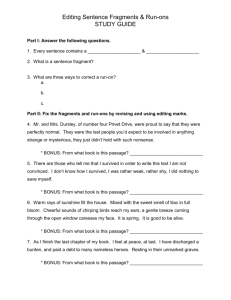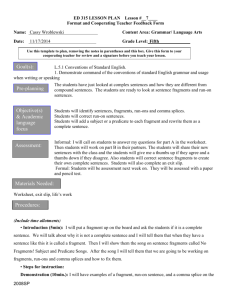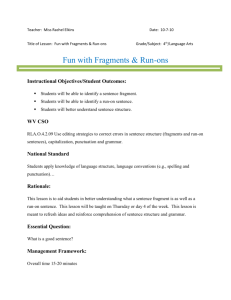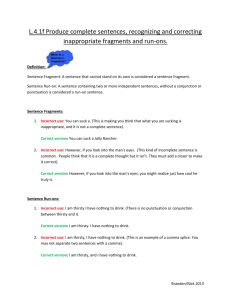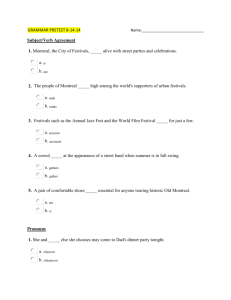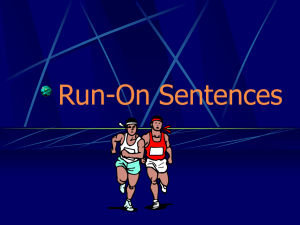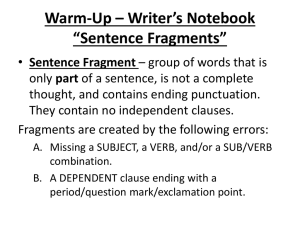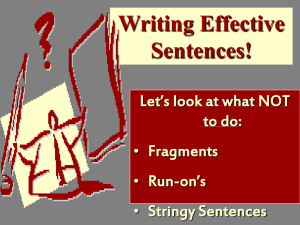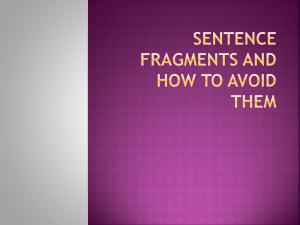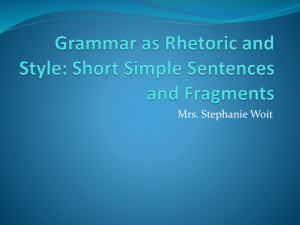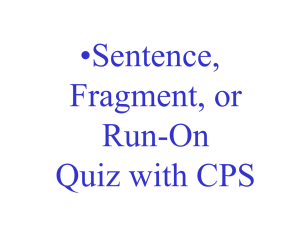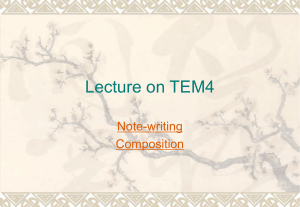Fragments and Run-Ons Worksheet: Grammar Practice
advertisement
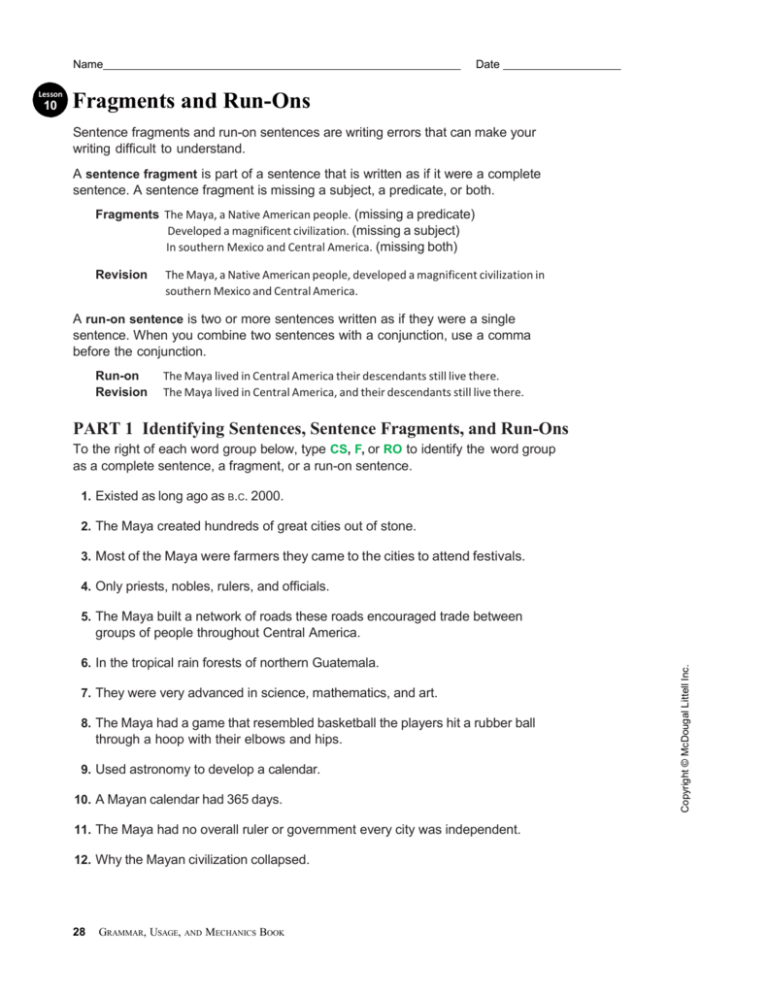
Name Lesson 10 Date Fragments and Run-Ons Sentence fragments and run-on sentences are writing errors that can make your writing difficult to understand. CHAPTER 1 A sentence fragment is part of a sentence that is written as if it were a complete sentence. A sentence fragment is missing a subject, a predicate, or both. Fragments The Maya, a Native American people. (missing a predicate) Developed a magnificent civilization. (missing a subject) In southern Mexico and Central America. (missing both) Revision The Maya, a Native American people, developed a magnificent civilization in southern Mexico and Central America. A run-on sentence is two or more sentences written as if they were a single sentence. When you combine two sentences with a conjunction, use a comma before the conjunction. Run-on Revision The Maya lived in Central America their descendants still live there. The Maya lived in Central America, and their descendants still live there. PART 1 Identifying Sentences, Sentence Fragments, and Run-Ons To the right of each word group below, type CS, F, or RO to identify the word group as a complete sentence, a fragment, or a run-on sentence. 1. Existed as long ago as B.C. 2000. 2. The Maya created hundreds of great cities out of stone. 3. Most of the Maya were farmers they came to the cities to attend festivals. 4. Only priests, nobles, rulers, and officials. 5. The Maya built a network of roads these roads encouraged trade between 6. In the tropical rain forests of northern Guatemala. 7. They were very advanced in science, mathematics, and art. 8. The Maya had a game that resembled basketball the players hit a rubber ball through a hoop with their elbows and hips. 9. Used astronomy to develop a calendar. 10. A Mayan calendar had 365 days. 11. The Maya had no overall ruler or government every city was independent. 12. Why the Mayan civilization collapsed. 28 GRAMMAR, USAGE, AND MECHANICS BOOK Copyright © McDougal Littell Inc. groups of people throughout Central America. Name Lesson 10 Date Fragments and Run-Ons More Practice PART 2 Identifying and Correcting Fragments and Run-Ons CHAPTER 1 On the line after each word group below, type CS, F, or RO to identify the word group as a complete sentence, a fragment, or a run-on sentence. Then rewrite each fragment or run-on as one or more correct sentences. Add sentence parts as needed. 1. It’s cold today remember to bring your jacket. 2. Down the street. 3. Cary is a drummer in a band. 4. The play begins at 2:00 we had better hurry. 5. Hundreds of people in the stands. PART 3 Correcting Fragments and Run-ons Rewrite this paragraph, correcting each fragment and run-on. You may add words to any fragment to make it a sentence or combine it with another sentence. To correct a run-on, you may either separate the sentences or join them correctly. Copyright © McDougal Littell Inc. The Aztecs ruled a mighty empire in Mexico. During the 1400s and 1500s. Aztecs had an advanced civilization they built cities as big as any in Europe. The Aztecs built a huge city. On an island in a lake. A population of one hundred thousand people. Conquered other cities in Mexico. The conquered people sent food as a tribute they also provided gold and silver. GRAMMAR, USAGE, AND MECHANICS BOOK 29 Name Lesson 10 Date Fragments and Run-Ons PART 4 Rewrite this paragraph, correcting each fragment and run-on. You may add words to any fragment to make it a sentence, or combine it with another sentence. To correct a run-on, you may either separate the sentences or join them correctly. The main food of the Aztecs. A thin cornmeal pancake called a tlaxcalli. In Spanish, this food is called a tortilla the Aztecs wrapped these pancakes around meat and vegetables to make tacos. Created a drink made with chocolate. This was one of their favorite drinks only the wealthy could afford it often. These foods, developed by the Aztecs. Have become popular all over the world. B. Recognizing and Revising Fragments and Run-ons Read these notes one student wrote to use in a report. First figure out what the writer was going to say, and then use the information to write a paragraph. Use complete sentences instead of fragments and run-on sentences. Add any words that you need to make the paragraph understandable. Use a separate piece of paper, if nexessary. Braille. A code of small raised dots on paper that can be read by touch. Louis Braille, a 15-year-old French student. At the National Institute for the Blind in Paris. Developed this raised dot system in 1824. Braille worked out an alphabet and numerals using this system he even figured out how to use the raised dots to write music. Read this system by running their fingers over the dots. Each Braille page has words written on both sides of the paper, dots on one side do not interfere with the dots printed on the other side. This system of writing for the blind. Named after Louis Braille. Copyright © McDougal Littell Inc. CHAPTER 1 A. Proofreading for Fragments and Run-Ons 30 GRAMMAR, USAGE, AND MECHANICS BOOK
